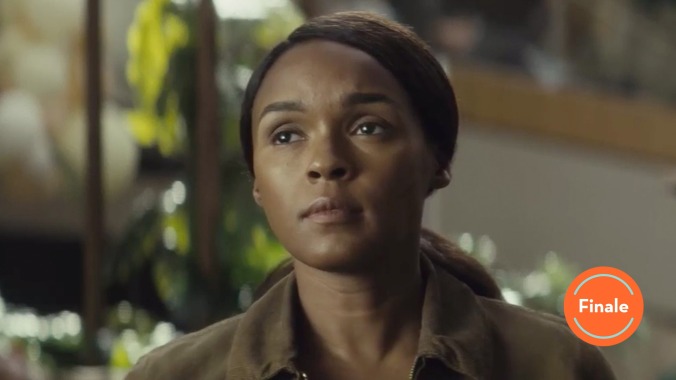In its season finale, Homecoming wipes the slate clean in a major way


One of the many pleasures of season one of Homecoming was that its scope never felt too grand. This was a small story of very personal struggles; yes, these men and women were caught up in the machinery of a corporation whose reach felt as though it stretched far beyond what we could see, but the triumphs and tragedies of the series were never about anything other than the lives we were watching unfold. So as this new season progressed, that same sense of intimacy was at work, with our attention focused solely on the travails of four people: Alex and her transformation, Audrey and her ambition, Walter and his search for the truth, and Leonard’s stubborn refusal to play the game. There were others who hinted at the wider world, especially Bunda and her mission to maximize the possibilities of Leonard’s crop, but the stakes once more felt deeply intimate and relatably small.
Then along come Walter and Leonard to lay waste to an entire company and the people outside it who stood to profit. Homecoming made its world a little bigger, all so it could be reset to zero in the end.
I said a couple episodes back that this season of Homecoming was a tragedy, and this finale really drove that point home. Both cathartic and melancholy, it simultaneously delivers a satisfying revenge scenario and immediately undercuts any exhilaration by showing the bleak human cost of that revenge. Walter Cruz exacted his pound of flesh for what was done to him (and to prevent it from being done to others), and the price was the memory of nearly every single person inside the Geist building who was celebrating the new partnership with the Department of Defense. Teaming up with Leonard, Walter disguises himself as a catering employee and uses gallons of the serum to spike the punch used for Bunda’s toast, a literal drinking of the Kool-Aid that wipes out the lives of everyone who participated. Sure, they’re still alive, but the person they were is gone. The screen splitting into two and even three at the moment of Walter’s vengeance, everyone begins to collapse, slowly falling into a stupor as the drug takes hold.
The denouement is quietly devastating, as these people we’ve spent all season with mourn the impending loss of everything they know. In a strange way, Alex becomes the shepherd, the only one who understands what’s coming, because she’s already experienced it. “Is it gonna hurt?” Audrey asks her, and the almost childlike purity of the question lands powerfully. Audrey’s last moments are reflective and anguished, though she also exhibits a woeful sense of inevitability, as though the person who always tried to think through the worst in order to prevent it feels like this punishment is earned, solely because she never even considered it. When Walter tells Alex to go, she stays instead—not because she has feelings for this person she technically doesn’t know, but because, “I know what it’s like to wake up like that. Alone.” It’s harsh.
Even Bunda’s comeuppance carries with it a sense of immense loss. Her daughter is getting married next week; “I was supposed to give her away,” she trails off, the realization of the many innocents outside this situation who will be hurt by it settling in for both her and the viewer. The back and forth between her and Leonard summarizes their incompatible worldviews—she points out that great advances always come with a cost, and he refuses to have any part of it. She’s right, he is stubborn. And while he may be one of the only people to retain his memory, the show drives home that perhaps it’s more of a curse than a blessing. “I fucked things up pretty good,” he flatly says, and unlike almost everyone else, he feels the weight of that guilt, and will carry it with him the rest of his life. His company is gone, his life is a shambles, and all he gets to keep is the knowledge that his single-minded project is responsible for nearly everything that came to pass.
But there’s a sliver of hope amid the sadness, and it lands in the lap of Walter. Getting back into his pickup and preparing to head off and try to make some semblance of a life for himself, he sees that Leonard has left a file in the passenger seat, and it’s not just Walter’s file. It contains information on every single person who was in the Homecoming program. He only gives a slight half-smile before driving off to the strains of a cover of Sinatra’s “My Way,” but the significance is obvious: Walter is going to try and provide some relief to the people out there suffering the same nagging sense of loss that he had. It’s an uplifting thought—maybe the only uplifting one in the finale—and it’s given to the one person who might actually deserve that respite from his troubles.
This was a small-scale story right up to the end, so it’s interesting to see the show go out on such a large and splashy finish. It doesn’t get much more definitive than wiping clean the minds of nearly all the major characters and everyone at the company that drove the plot forward. There wasn’t a lot of subtext or symbolism to this season, outside of the questions raised by its narrative about morality and the choices we make. It’s rare to see a smart and pessimistic portrayal of a relationship between two women of color as the driving force behind a big expensive series, much less one that makes no bones about their unhappiness without ignoring the ways in which their happiness is wrapped up in the same complicated situation. But the series has always been first and foremost about delivering an old-school dramatic thriller, combining Hitchcockian tension with ’70s-style aesthetics to create a pleasurably efficient adventure tale. If there’s a criticism to be had, it’s that this season of Homecoming almost went too far in the direction of playing out every single moment between then and now, leaving nothing to the imagination and making sure all questions were answered, all mysteries resolved. It’s okay to leave some things unknown. But in its final moments, Homecoming offered the flip side of that coin: For all these pitiable people, everything that came before will be un-known.
Stray observations
- Baseless speculation corner results: Wow, I was not good at guessing how things were going to play out, huh? I think maybe one of my predictions came to pass.
- “I fucking love that idea!” “You are my fucking Helen Keller.” “My hero.” Joan Cusack’s Bunda, MVP to the end.
- One of the interesting elements to the story’s memory-loss effects is the idea that there’s a personality below that identity shaped by our memory. Alex: “I know I did something…I can’t say it, but I feel it.”
- Also, I like that the show highlights the ultimately selfish way that placing yourself first can curdle into placing others into lesser positions. “Everyone else, they’re just people,” Audrey explains to Alex, and the way she says “people” tells you everything about what that implies.
- Everyone gets called out this episode. Walter to Leonard: “You’re not old. You just got a shitty attitude.”
- I enjoyed how the score remained committed to over-the-top, old-school swoons of minor-key tension-signifiers.
- Thanks, everyone, for accompanying me on this journey through Homecoming. I don’t know if it’ll be back again, but if it is, I’ll look forward to recovering the memory of it with all of you.